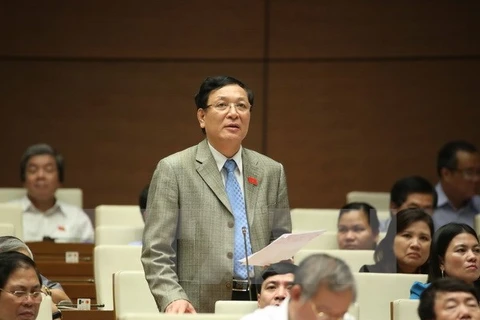Hanoi (VNA) – The Government will work hard to realise targets set by the National Assembly for 2015 as best as possible, including a GDP growth rate of more than 6.5 percent, Prime Minister Nguyen Tan Dung said.
The leader made the pledge while delivering a report clearing up issues that draw great concern of NA deputies and voters nationwide, at the NA’s meeting in Hanoi on November 18, the final day of the Question-Answer session.
The PM reported that the country’s socio-economic development in October and November continues to show positive signs.
The consumer price index (CPI) expanded by about 0.1-0.2 percent this month, pushing the CPI in the January-November period up by around 0.6-0.7 percent, and the figure for the year is estimated at below 2 percent.
Export turnover for the 11-month period hit some 149 billion USD, up 8.5 percent year on year while State budget collection was estimated at over 94 percent of estimates, up 8.3 percent, he said, adding that interest rates, exchange rates and the foreign exchange market remain stable.
PM Dung also affirmed that the Government will promptly implement the NA’s resolutions on socio-economic development from the first days of next year.
In reply to several deputies’ question on the content of the socialist-oriented market economy, the Government leader stressed that such an economy comprises many forms of ownerships and economic sectors, and operates fully in line with market economy rules. At the same time, the State utilizes institutions, laws, resources and other tools to distribute and re-distribute in order to realise social equity and progress, ensure social security and welfare, improve the general living standards, narrow the gap between the rich and the poor, and protect the environment.
The functions of the State and the economy will be defined clearly, with the State focusing on creating favourable conditions and environment for the people and enterprises to operate freely in business and production activities as well as compete on an equal and transparent footing.
The PM said in order to realise the socialist-oriented market economy, the Government is completing suitable institutions, laws, mechanisms and policies, developing modern and open markets of goods, service, financial, real estate, labour and science-technology in line with international commitments while enhancing domestic productivity and internal strength.
At the same time, the Government has persistently applied the market price mechanism on all commodities and services while improving the management of State agencies.
Regarding the implementation of the United Nations’ 2030 Agenda on Sustainable Development Goals (SDGs), PM Dung affirmed that as a responsible member of the UN, Vietnam will strive to effectively carry out the agenda, which is both the targets and requirements of the country’s sustainable development and contributions to global growth.
In that spirit, the Government will build a 15-year master plan and annual and five-year action plans which define priority goals and tasks in a suitable roadmap.
Clarifying problems related to multi-dimensional poverty reduction, the PM said while about 30 million Vietnamese people escaped from poverty over the past two decades, the income-based poverty criteria in the past has shown limitations in reflecting the real living conditions, thus hindering the classification of those who in need as well as the design of effective poverty reduction.
Therefore, the Government will swiftly issue a multidimensional poverty measurement approach for 2016-2020, which address not only income but also access to essential social services such as health care, education, housing, information, clean water and hygiene.
According to the PM, based on the new criteria, the rate of poor households is estimated at 12 percent and that for near-poor at 6 percent, which would require an additional 12 trillion VND to carry out support policies for those groups.
Regarding labour-related issues emerging from the TPP agreement, the PM said after the deal is ratified, Vietnam will amend and supplement or issue new legal documents to carry out labour contents stipulated in the pact in line with the country’s Constitution and laws as well as regulations of the International Labour Organisation (ILO).
He noted that the fulfillment of labour commitments of the TPP agreement is a continuity of observance of regulations of the ILO, to which Vietnam is a member, and it will not affect the legal status, role, functions and operation of the Vietnam General Confederation of Labour.
Responding to questions on the East Sea and national sovereignty and interests in the relationship with China, PM Dung stressed the Party and State’s policies of doing the utmost to enhance the friendship and equal cooperation for mutual benefits and development in all areas with the neighbouring country.
At the same time, Vietnam resolutely protects its independence, sovereignty, territories, seas, islands and national interests in accordance with the Party’s resolutions, and the country’s Constitution and laws, as well as the UN Charter, international law and regional commitments, especially the 1982 UN Convention on the Law of the Sea and the Declaration on the Conduct of Parties in the East Sea (DOC).
Socio-economic development should go in tandem with national defence and security protection and foreign relations, he stressed.
The presentation of the PM wrapped the two-day-and-a-half Q&A session, which is said to be unprecedented as all Government members were present to field questions on issues in their remit and NA deputies are free to ask questions on any issues.
In previous Q&A sessions, only four ministers were selected to appear to answer questions, and the issues addressed during the sessions were also decided beforehand.
The session was broadcast live from the National Hall on national television and radio.-VNA
























